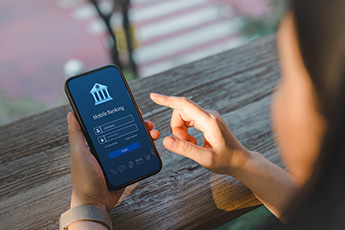We found it interesting to know that the average person falls asleep in just 7 minutes, while experts say you should be able to do so in 10 to 15 minutes, and if it takes less than 5 minutes you are sleep deprived. Speaking of all things sleep, you may not know that cats sleep about 67% of the time, large dogs sleep about 75% and humans only sleep 33%. Also, 12% of people dream only in black and white and 15% of people are sleepwalkers.
When it comes to banking, the need for mobile connectivity is so potent that 75% of respondents to a Bank of America survey professed to be sleeping with or next to their smartphones. While the survey is on the older side, it remains disconcertingly relevant today. We would venture to guess people are even more tethered to their phones now than they were a few years back.
As mobile continues to be an even bigger mainstay of everyday life, community banks are continually adapting. Here are some of the latest ways banks can use mobile to their advantage:
Recruiting: Recruiting is becoming an increasingly digital process. While there are barriers to mobile applications such as length, platform issues and smaller screens, job applicants are becoming more comfortable with this medium. Research shows the mobile application completion rate for recruits is the highest it has ever been at 35%, according to Paychex. What's more, 45% of applications are started and/or completed from a mobile device. Making your job applications mobile-friendly could increase your applicant pool and bring you more tech-savvy candidates.
Benefits: Employees like having the ability to check their benefits on the go. Consider that apps account for 89% of mobile media time, while only 11% is spent on websites, according to a Smart Insights report. That means your benefits provider should be offering you mobile-friendly functionality. Better yet is to offer an employee benefits app that your staffers can download and use at their convenience.
Loans: Customers are also starting to get more comfortable with mobile loans, results from a 2017 Fiserv study show. For instance, to speed up the loan process, 56% of consumers polled said they would be willing to use a mobile device to e-sign loan documents. Further, 54% said they'd be willing to take and upload photos of loan documents and 51% said they'd be willing to verify their identity with a photo. Also telling is that 42% said they would be willing to provide access to their bank by providing their credentials to other online banking applications.
There's also evidence to suggest customers are willing to use mobile apps to perform routine functions such as determining loan payment due dates, checking account balances and requesting a loan payoff.
As mobile technology continues to improve, we expect there will be even more apps that banks can use to make for a more employee-friendly and customer-friendly experience.
Yet, there is certainly no need to lose sleep over the rapid changes in on-the-go mobile technology.




